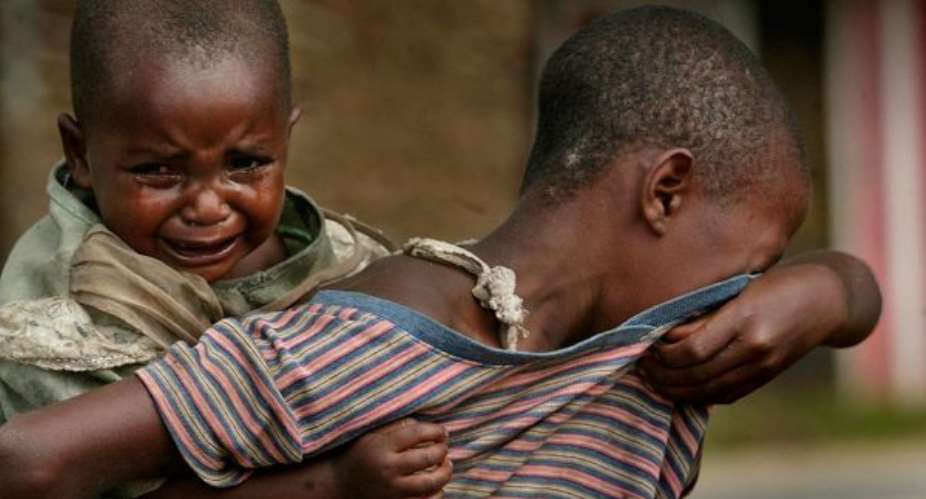Africa wants to know, when shall I? When shall I reach the top like other rich continents? When shall I gain the respect I deserve as one of the richest continents in the world? Because my name has been dragged in the mud for centuries, despite my treasures and vast resources than any continent in the world.
Africa is not growing and if it is, then it's at a snail pace. With such deposits of vast amount of resources Africa shouldn't have been in this miserable state. We can't blame the colonial masters all the time because after looting they didn't take Africa away when independent swept through the continent.
The majority of Africans are suffering and millions of children are facing the threat of malnutrition and hunger. Neither international humanitarian aid, nor the available natural resources have saved Africa from its troubles, and its wounds because of corruption and poor management of institutions.
According to the United Nations, out of 49 poorest countries, 33 are African countries and foreign direct investment in African economies is only 3% of the global, and they go primarily to the most developed North African region or the countries of the continent, rich in oil and gas.
Meanwhile, Sub-Saharan Africa continues to live in misery. Its per capita GDP in 2004, was even lower than the same figure in 1975, although there are also many valuable natural resources. Based on the United Nations Human Development Index, the list of the most backward countries in 2009 was 24 states. Of these, 22 are from sub-Saharan Africa.
Why is Africa unable to cope with poverty? More and more experts link the answer to security problems, insisting on a direct relationship between the level of security in the country and its development prospects. For example, military conflicts destroy the economy, normal conditions of social development, and forced mass migration.
Since 2000, as many as 40 peacekeeping operations have been conducted in 14 African countries. During the past decade, half of the African states were involved in military conflicts, and in 2009, 73% of the UN peacekeeping forces were deployed on the black continent.
It is estimated that, since 1990, as a result of wars, Africa has lost $ 150 billion, and half of all military casualties during this period are Africans. The conflicts in Africa have generated hunger, disease, crime, etc. In the Democratic Republic of the Congo alone, the war claimed 5 million lives.
Conflicts in Africa are most often regional in nature and usually arise from porous borders, ethnic hostility and other common problems of neighboring countries. Ethnic and religious discord, superimposed on the acute political, economic and social problems of individual segments of society. This is the typical basis of the African crisis.
In addition, various extremist military groups, such as al Qaeda, Islamic Jihad in Egypt, Boko Haram in Nigeria, Al Shabab in Somalia, etc., are undermining the foundations of stability in Africa. Without any warning, they target weak spots and cause pain and fear.
An obvious example of this state of affairs is Somalia, where the government, even with the help of AMISOM forces, cannot fully control the situation in the country.
"Now you will understand the reason I am crying, even though I am one of the richest continents in the world, no one has respect for me."
"When shall my riches be used to develop the continent, to create employment, to build good schools, to build good health care centers, to provide good drinking water, to build good roads, so that farmers can bring their harvests to the nearest markets?"
"I have provided you with everything you need to make life easy for the common African. I will, therefore, sit and watch you carefully and see what you can do if you claim you deserve to be an African leader."





 Minority will expose the beneficial owners of SML, recover funds paid to company...
Minority will expose the beneficial owners of SML, recover funds paid to company...
 Prof. Opoku-Agyemang has ‘decapitated’ the NPP’s strategies; don’t take them ser...
Prof. Opoku-Agyemang has ‘decapitated’ the NPP’s strategies; don’t take them ser...
 Abubakar Tahiru: Ghanaian environmental activist sets world record by hugging 1,...
Abubakar Tahiru: Ghanaian environmental activist sets world record by hugging 1,...
 Prof. Naana Opoku-Agyemang will serve you with dignity, courage, and integrity a...
Prof. Naana Opoku-Agyemang will serve you with dignity, courage, and integrity a...
 Rectify salary anomalies to reduce tension and possible strike action in public ...
Rectify salary anomalies to reduce tension and possible strike action in public ...
 Stop all projects and fix ‘dumsor’ — Professor Charles Marfo to Akufo-Addo
Stop all projects and fix ‘dumsor’ — Professor Charles Marfo to Akufo-Addo
 Blue and white painted schools will attract dirt shortly – Kofi Asare
Blue and white painted schools will attract dirt shortly – Kofi Asare
 I endorse cost-sharing for free SHS, we should prioritise to know who can pay - ...
I endorse cost-sharing for free SHS, we should prioritise to know who can pay - ...
 See the four arsonists who petrol-bombed Labone-based CMG
See the four arsonists who petrol-bombed Labone-based CMG
 Mahama coming back because Akufo-Addo has failed, he hasn't performed more than ...
Mahama coming back because Akufo-Addo has failed, he hasn't performed more than ...
